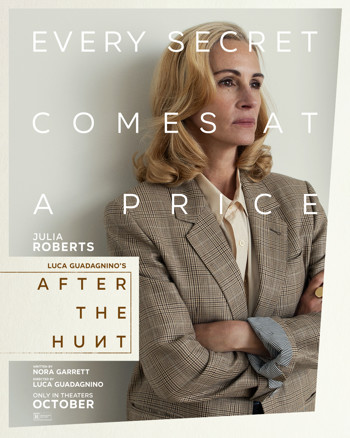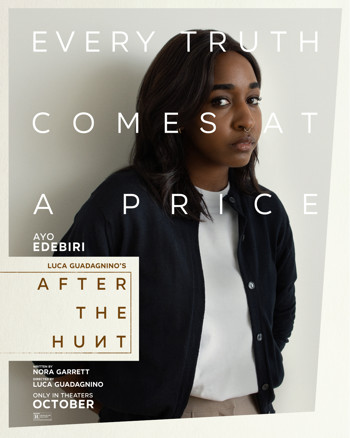Movies

New Releases • A-D • E-H • I-P • Q-Z • Articles • Festivals • Interviews • Dark Knight • Indiana Jones • John Wick • MCU
After the Hunt, starring Julia Roberts, Ayo Edebiri and Andrew Garfield, directed by Luca Guadagnino
Trailer: Amazon MGM Studios
After the Hunt
Directed by Luca Guadagnino
Rated R
Schooled 17 October 2025
#AfterTheHuntMovie
After the Hunt might work better as a term paper than a movie.
Stars Misaligned

The last frames are of a $20 bill lying on top of a tab for a glass of wine. The camera lingers there for a bit too long. Then, unexpectedly crashing through the fourth wall, the director yells, "CUT!" The screen cuts to black for another extended pause before the end credits roll.
Oddly, strangely, it’s a fitting end to a movie that too often feels like nothing more than an experimental student film. Albeit, a student film made by seasoned professionals, including director Luca Guadagnino, who raised his profile with Call Me By Your Name, starring Timothee Chalamet, in 2017 and Challengers, starring Zendaya, in 2023. After the Hunt stars Julia Roberts, Andrew Garfield and Ayo Edebiri – experienced artisans one and all – in a story about numerous moral and ethical indiscretions in higher education. More specifically, the central focus revolves around a "Me Too" case of sexual misconduct at Yale.
Back in college, the author of this tear-down took a basic astronomy class. It seemed as though the staff was prepping the next group of NASA candidates. At one point, a teacher’s assistant wrote a note at the top of a heavily red-lined exam: "Do you ever look at the sky at night?"
As a matter of fact, yes. And it would seem as though Orion was always in view.
The point is this: filmmaking is about a different kind of stars gathering to form a different kind of constellation that tells a story. In the interest of paying it forward, it’s fair game to ask of this cast and crew in a similarly rude fashion if they’ve ever watched a movie because what they’ve put on the screen in After the Hunt simply doesn’t work as a movie.
Performative Discontent
A major problem with this starstruck project is the story itself. It begins on shaky ground and it never finds a solid place to stand.
That shaky start involves an elitist higher-ed social gathering at the stunningly luxurious New Haven apartment of Alma Imhoff (Julia Roberts), a philosophy professor gunning for tenure. One of her students, Maggie (Ayo Edebiri), goes to the bathroom. She’s advised by Alma to avoid one option because it has one of her husband’s "projects" going on in it (strangely inconsiderate timing to say the least) and instead Maggie’s advised to go to a specific bathroom elsewhere in the palatial apartment. There, she finds the roll of toilet paper has reached its end. While snooping around for more TP, Maggie stumbles upon an envelope taped to the underside of the last shelf in a cupboard. She peels it off the shelf and finds some very disturbing content.
It defies sound, educated logic Alma would consider that to be a smart hiding place for such sensitive, private material, but that’s how the stars align in this one.
As the party winds down, Maggie leaves with Hank Gibson (Andrew Garfield), another one of Maggie’s professors. An off-screen nightcap of some sort leads to a morning after of allegations and counter-allegations. Hank, Maggie claims, forced himself on her despite her repeatedly rebuffing his advances and saying "no."
This storyline between Maggie and Hank – oh so coincidentally – dovetails with the story contained in the envelope Maggie found in the bathroom.
Score Null
In fairness, there are some good ideas and observations kicking around in After the Hunt. With the movie set in Yale, there’s quite a bit of criticism and sarcasm about how the higher education system is coddling students too much. Particularly given the themes of Guadagnino’s Call Me By Your Name, Challengers and Queer (starring Daniel Craig), there’s even some surprising frustration with gender identification and pronouns, given Maggie is a lesbian. There’s also a sense of disgust over student protests (which are most likely misguided actions on the part of the over-privileged and underinformed) that’s balanced by tired disdain for the state of "stale, pale and male" environments.
But these ideas – so timely and so important – get lost in a movie missing some of the basics of storytelling and filmmaking.
First, let’s call out the score by Trent Reznor and Atticus Ross, the venerated musicians who’ve also performed under the moniker of Nine Inch Nails. Their score is horrible. At times, it’s like those nine-inch nails are scratching across a chalkboard. Do scenes of Alma vomiting really require the accompaniment of trumpets?
No.
But, as that score (supplemented by classical and other styles) bounces from jazzy notes to discordant Mahler-esque tones, there’s a scene in which Reznor and Ross seem to turn to Bernard Herrmann for inspiration. Herrmann was the music master behind some of the greatest scores of some of Alfred Hitchock’s greatest movies, including Psycho, North by Northwest and Vertigo. Those shades of Vertigo echo in a particular scene in After the Hunt and it’s an echo that highlights a key element Guadagnino desperately needs here: a central character worth caring about. Jimmy Stewart. Kim Novak. Janet Leigh. Somebody that serves as the conduit for the audience to experience – and care about – what happens on screen.
It’s a fun fact to note Gustav Mahler’s wife’s name was Alma. But, looking for some brilliant symbolism in this would be a journey into "deep-tissue psychology" that would likely lead to madness.
Psycho Analysis

As After the Hunt bounces around from one higher-ed theme to another, and forces audiences to suffer through one high-minded, elitist conversation after another, it never really gathers any steam or forward momentum. Perhaps it’s a basic problem of how the screenplay by first-timer Nora Garrett was written. To make this material and these themes work as a movie, consider the underlying experience of both the accuser and the accused. It moves in the realm of psychological thriller. Is – in this case – the accuser, Maggie (Ayo Edebiri), delusional? How about Hank (Andrew Garfield)? Or Alma (Julia Roberts)?
None is particularly likeable or sympathetic as the mud is slung in all the different directions. Maybe Alma’s accusations against Maggie are true; maybe she is the spoiled child of wealthy Connecticut socialites and maybe she’s not even trying to be a good student. And there’s also the accusation of a plagiarized paper. Maybe Hank’s actually a really good guy who needs to tone down his flirtatious ways, but it’s hard to be feel sorry for the guy, who’s conducted an affair with Alma behind her husband’s back. For that matter, maybe Alma’s husband, Frederik (Michael Stuhlbarg), isn’t a total snobby jerk and poor excuse for a spouse. At least his solid cooking skills – supplemented with a snootiness in the kitchen – are an asset to counter his significant liabilities.
These aren’t morally complex characters. They’re morally bankrupt.
What’s needed is a completely innocent, clean-hands third-party that is not involved in any misconduct or allegations thereof, but who is a friend and confidant to those who are. Have the paranoia grow and the walls shrink on this person as they try to uncover the truth. This person should lose their own grasp on reality as they find no one’s worthy of trust, with the actions of others having a destructive impact beyond the lives of those directly involved.
As it stands, who cares? That’s really the most criminal thing about After the Hunt. It squanders a lot of top-shelf talent while giving a whole lot of fresh hope to aspiring screenwriters. If Garrett, a first-time screenwriter (and actress in numerous shorts and podcasts), can sell this screenplay and get it turned into a major production, there is hope for us all.
Image Tarnished
As jarringly distracting as the experimental score, Guadagnino wants to play with sound effects, camera movements and angles in search of something fresh while not necessarily caring about the "why." There are close-ups on faces. Close-ups on hand gestures. Close-ups on hugs from both sides of the embrace.
These moments could all lead to something. They could and should be clues.
But, as the conversations unfold, it’s revealed Maggie had been trying to emulate Alma with her mannerisms and dress. Maybe it was a baseless accusation. Maybe it was a legitimate visual hook that never materialized amid all of Guadagnino’s experimentation. If there had been more overt displays of this behavior – even as an intentional misrepresentation of Maggie’s ambitions – it’d make for a more compelling experience. Or maybe Guadagnino was simply undermined by efforts at subtlety being overwhelmed by the obnoxious.
As for Alma, while she ponders ethics and philosophy, she rails against the state of student conduct. She also seeks a pity party about her own professional challenges: moving up in the sad-sack world of adjunct professors to that highly coveted status of tenured professor. But then she forges a prescription to combat her ulcers. This is the genius of a wannabe Yale tenured professor?
No wonder the Ivy League is wilting.
We all have our trials, tribulations and temptations, Alma. Find your North Star and embark on a better, more meaningful journey.
• Originally published at MovieHabit.com.


